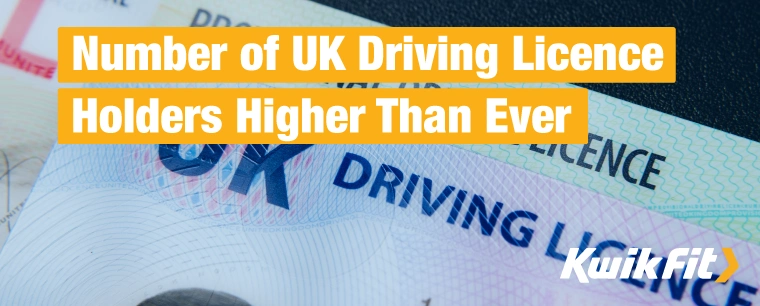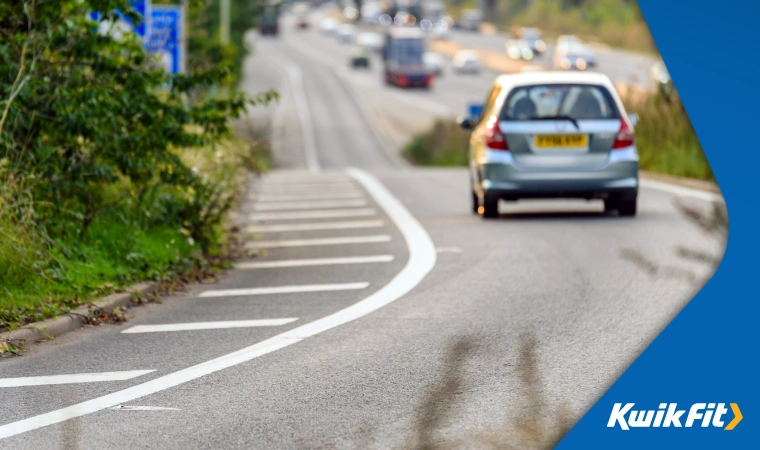Number of UK Driving Licence Holders Higher Than Ever
Jack Dreyer | Monday 22nd April 2024 9:00am

According to recent data from the Driver and Vehicle Licensing Agency (DVLA), there are more driving licence holders than ever, yet, the number of young people with driving licences has gone down. There are more 70+ year olds keeping hold of their licences despite having to renew at 70 and every 3 years after. In fact, thereís also been an increase in the number of 80 year olds renewing their licences too. It seems that the total number of older drivers has gone up dramatically since last year and whilst this shows us that the freedom and convenience of motor travel persists - it does raise some questions as to what the future will hold as fewer young people get licences or even learn how to drive.
Weíre going to do a deep dive into why young people are choosing not to drive, why older people are renewing their licences and what it means for the future.
How to get a driving licence in the UK
Before we dive into the details of why people are choosing to ditch or keep their licence, let's first explore what the licence is, how to get it and what the different types of licence are.
What is a provisional licence?
What is the difference between a provisional and full driving licence? Well, the provisional licence is designed, essentially, as a preliminary document which allows you to begin your learning process towards a full licence. The provisional licence is often a young personís first form of ID because, as the government website says:
ďYou can apply for a provisional driving licence when youíre 15 years and 9 months old.
You can start driving a car when youíre 17.
You can drive a car when you are 16 if you get, or have applied for, the enhanced rate of the mobility component of Personal Independence Payment (PIP).Ē
So, how do you apply for a provisional driving licence? Well, the process is very simple and can be started on this page. You can get your provisional licence as long as you are 15 years and 9 months old, can read a number plate from 15 metres away and have been given permission to live in Great Britain for at least 185 days. It costs £34 when you apply online. (You can also apply by post).
That covers the basics of the provisional licence but the real question is, can you drive with it, and how do you learn to drive?
How to get a driving licence
Once you have your provisional there are some rules regarding when and how you can drive according to the law:
ďYou must have a provisional driving licence for Great Britain or Northern Ireland when youíre learning to drive or ride.
You must be supervised when youíre learning to drive a car. This can be by a driving instructor or someone else who meets the rules, for example family or friends.
The car you learn in must display ĎLí plates.
You can drive at any time, day and night.
You can only drive on motorways if all of the following apply:
- youíre driving in England, Scotland or Wales
- youíre with an approved driving instructor
- the car is fitted with dual controlsĒ
You can find more information about the rules around provisional licences on this page here.
Learning to drive can be a stressful, challenging and expensive process, but it is ultimately rewarding and, despite the difficulties, can be done. We have a number of handy guides to help learners, including a list of tips and a guide on how to pass your driving test.
What is an international licence?
An international licence, or an international driving permit (IDP) allows you to, unsurprisingly, drive a car abroad. However, before you rush off to apply for an international licence, itís probably worth checking if you need an IDP to begin with by checking the list of countries and their requirements here.
After youíve worked out if you need a licence for the country or countries you are visiting you can get your IDP from a shop which operates paypoint and will need to take your passport, a passport photo, a valid driving licence and £5.50 for the application. After you get your application, you must remember to get the appropriate insurance and to take whichever documents you need to the country you are visiting.

Do driving licences expire?
As we get to the reasons why fewer young people are driving and more older people are renewing their licence, letís go over the rules for licences and what some of the pitfalls are.
Firstly, yes, driving licences do expire every 10 years. You can find your expiry date on the front of your card; 4a shows you when you last renewed your licence, 4b shows when you need to renew it. If you need to renew you can do so online.
Renewing your licence doesnít mean you have to retake your test. Usually you only have to retake your test if:
- If you have certain health conditions - the government has a list online of conditions which should be reported to the DVLA if they develop.
- Driving offences which get you banned from driving, this can be through a conviction for a driving offence or by accruing 12 or more penalty points within 3 years. Depending on the length of the ban you may be required to retake your test.
- You donít need to retake your driving test when you turn 70, but you do need to renew your driving licence every 3 years. One of the reasons older people may need to retake their driving test is because medical conditions emerge.
Adjusting to life without driving can be very hard for many seniors who have only known the freedom of a car.
Why are young people not driving?
There are multiple reasons why young people are choosing not to drive, but there is a difference between those who have learnt to drive and choose not to, and those who choose not to learn in the first place.
On a practical level, just passing the test doesnít change the fact that youíre now on your own, and with your new freedom comes new responsibilities. The first year as a new driver is daunting and comes with a lot of things to be aware of, and thatís not considering the costs of insurance, road tax, buying a car, petrol and having a place to park in the first place. With the cost of living, many young people simply canít afford to have a car and instead opt for public transport.
As for those who donít want to learn how to drive, there a multitude of factors which include the cost of learning itself, environmental concerns and uncertainty over the future of motoring - plus, considering the above costs and concerns for those who have passed, many young people may simply anticipate the future problems they may have and therefore see no value in even learning.
Adding to this is a recent freedom of information request which shows that the majority of UK test centres have average waiting times of a month, many were even longer.
So, considering the increasing number of young people opting to not get a licence, why then are there more licence holders than ever?
Why are there more licence holders?
It must be remembered that whilst the number of young people getting licences is falling, there are still many young people still learning to drive and passing their tests. The real crux here is that a much larger number of 70 year olds are renewing their licences. In fact, of those who were 70+ but under 80, the number went up by over 200,000, in 80+ it went up by more than 100,000 and a third more centenarians were also renewing their licence too. So perhaps the average age of road users may have just gone up just a little higher.
For many young people, no matter how tantalising the freedom of a car may be, it just simply isnít worth the long waits, costs and uncertainty. However, for those who have driven their whole lives, the loss of that freedom is simply not an option they wish to consider. Perhaps the most obvious reason so many older people wish to keep hold of their licences is that, as young people move away from small towns and villages, and retirees move in, the car is a way to stay connected to family and friends. The car is a vital tool for social connection, something many older people desperately need.

Can we encourage young people to drive?
There are many uncertainties over the future of cars. Encouraging young people to go electric seems like a fruitless conversation considering the price tag (or perceived price tag) on electric vehicles, yet there needs to be some conversation over what will happen in the future as combustion vehicles are phased out of production.
For many young people, the multiple unpredictable costs associated with owning a car, when itís already hard enough for many to get on the housing ladder as it is, simply make the prospect unappealing at best, terrifying at worst. The idea of forking out thousands on a car at the worst moment and becoming bankrupt in the process just makes investing money and time on learning not worth it. Even if someone purchases a car for cheap, they will need to get it serviced to look for any hidden problems, so it throws into question how economical anyone can really be.
Predictable fees make owning a car easier
Young people are far more accustomed to a subscription based society, one where most services, whether cosmetic, entertainment or health related, are paid in small sums over periods of time. Thankfully. Kwik Fit does have the answer to this for cars, with our own subscription based service which can wrap your carís costs into an affordable, predictable monthly sum, with optional add ons and bonuses.
We hope that for many new drivers, who may be feeling the pinch and are worried about a sudden problem costing them a bomb, that a predictable monthly fee which can include tyres, MOT and/or a full annual service* would put them at ease. If you are interested in joining the Kwik Fit club you can find out more here, or, if youíve been reminded by this article that youíre long overdue for a service on your car, perhaps having just renewed your licence, then get in touch with your nearest Kwik Fit centre.
*For details of what is included in a Full Service, please see our servicing checklist.
Any facts, figures and prices shown in our blog articles are correct at time of publication.
Featured Articles
Is it Illegal to Drive With One Headlight?
Saturday 19th July 2025
Wondering if itís illegal to drive with one headlight? Learn about the safety risks and penalties of illegal blown bulbs and why you should fix them promptly.
Air Con in EVs & Hybrids: Experts Answer Your Questions
Monday 30th June 2025
Does air con drain EV batteries? Can you use the air con while charging an electric car? Find out the answers to these questions & more from Kwik Fitís experts.
Why Is Your Car Making a Noise? Fixes & Tips
Friday 13th June 2025
When your car starts making unexpected noises, it can certainly be quite disconcerting; it may be nothing to worry about, but hereís what you need to know.









